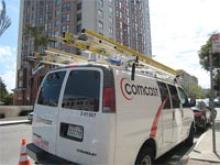Comcast Customers Call for Competition
Two cities, located on opposite coasts, have recently cried out for cable competition in their communities.
A few weeks ago, SunBreak ran a story under "Why Comcast Needs Competition...Badly." The post describes a significant outage in Seattle and Comcast's slow response to fix the problem.
You may think to yourself, Hey, come on, it's 90 minutes out of your day. But what I think about is how much time cumulatively was wasted in Seattle this morning, much of it simply because people would not have been sure where the problem was. An early, all-hands-on-deck announcement from Comcast would have been a big help. It seems slightly insane that a company that provides internet service isn't very good at using the internet.The folks at Sunbreak apparently were not aware that the City is still slowly considering building a network to ensure everyone in the community has affordable high speed broadband access (which would likely be far more reliable than Comcast's network). After I noted this in the comments, they reprinted one of my posts about Seattle's deliberations. Meanwhile, the folks in Scranton, Pennsylvania, (immortalized in the television show The Office) have been asking when they get the faster broadband now available in Philly, Pittsburgh, and parts of the Lehigh Valley. The answer came bluntly from Stop the Cap: Sorry Scranton, You’re Stuck With Comcast Cable… Indefinitely An article from the Times Tribune explains why the private sector fails to provide competition:
"Offering out television service is expensive, too expensive for most smaller telephone companies," said telecom industry analyst Jeff Kagan. "So many are reselling satellite service to keep customers who want one bundle and one bill." Because of that, satellite television providers, who were never a formidable challenge to conventional cable companies, gained market share, Mr.



